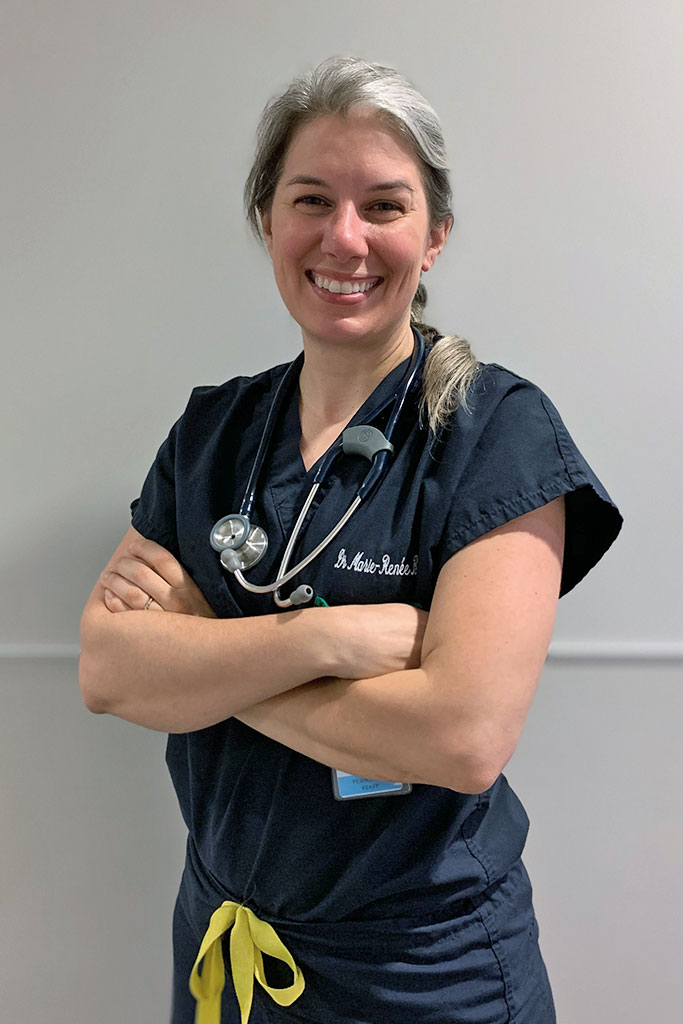Marie-Renée Lajoie is among a number of doctors at McKinsey who joined the front lines in the fight against the coronavirus. Before joining the Boston office almost three years ago, she was a full-time emergency-room physician practicing in the Montreal hospital she returned to during the pandemic.
We spoke with Marie about her experience and how it has informed her work since returning to the firm.

Tell us how you made your way back to your training hospital in Montreal.
A McKinsey program allows us to step away from the firm at times between client engagements. Since I joined McKinsey almost three years ago, I’ve been using this opportunity to work at the hospital.
When coronavirus started spreading, I was keeping up-to-date with what was happening. I saw that cases in Quebec were expected to peak in March. So, I went. The hospital was the first designated adult COVID-19 center in Quebec. What was initially meant to be three weeks away from the firm became five—I wanted to help as long as I could.
What were your main duties?
We wanted to make sure the hospital was prepared and thinking about escalation and response planning. One thing we did was fully design a new area that we call our garage. We converted half of our ambulance bay into a completely new emergency department to accommodate walk-in patients with COVID-19 symptoms. This type of work and team culture resulted in the department's high level of safety and performance.
There was so much information coming through. A lot of our work was just trying to understand and keep up. We needed to get re-skilled fast and unlearn some things that were deeply ingrained in us to respond to such a new and fast-changing situation.
Give us an example of something you had to unlearn.
One of the first things you learn in medical school is cardiopulmonary resuscitation, or CPR—pounding on the chest and trying to revive people. With COVID-19, however, most cardiac arrests are due to respiratory causes. So, CPR isn’t going to do much—you need to help secure the airway. More than that, doing CPR can expel fluids containing the virus into the air, potentially exposing everyone else in the room.
What was the experience like?
I remember the first time I went in the patient room all gowned up. I hadn’t done that in years since epidemics are not something we see often. But we each had a “COVID buddy” to help make sure we were doing it properly—the N-95 mask, the face shield, the gown, the gloves. And mine was knocking on the window saying, “Dr. Lajoie, wash your hands, wash your hands.” It was so different than what I was used to.
There were a lot of hard moments with patients. People not knowing if they’re going to see their families again, people asking whether or not they’d be okay before going on a ventilator. But it felt meaningful to be there helping as best as I could.
How has it shaped your return to the firm?
It’s reminded me of the scale of the work we do here. While at the hospital, I cared for patients directly. At McKinsey, we work with organizations, which means our work is broad and far-reaching—often across healthcare systems.
Having seen the impact of COVID-19 across so many levels, it motivates me even more to help strengthen our healthcare systems and global public health as a whole.
Lastly, what about this experience has inspired you most?
The sense of community I’ve felt—both in the hospital and within the firm. When I was part of McKinsey’s central team coordinating our COVID-19 response at the beginning of the crisis, I’d often hear what our Chinese colleagues and European colleagues were thinking and needing, and everyone was wondering how they could help.
Then when I got to the hospital, so many Chinese doctors were putting out their manuals on how they were thinking about COVID-19. Italian doctors were sharing how they were managing. I would get emails from friends of friends in Seattle about how hospitals there were managing.
It was a good reminder of how close we can be, especially with technology. And it made clear to me that we’re all in this together.